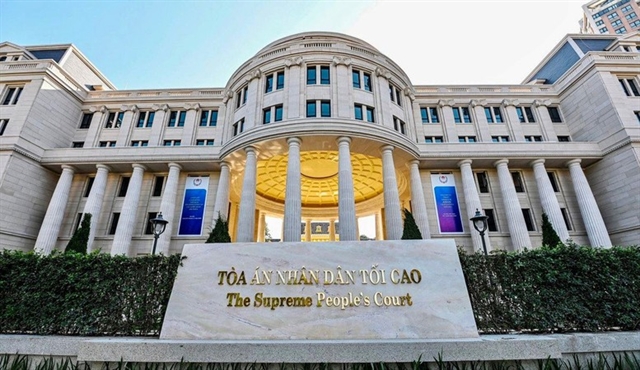 Economy
Economy

 |
| The Supreme People's Court of Việt Nam. — VGP Photo |
HÀ NỘI — National Assembly deputies discussed the establishment of specialised courts for intellectual property (IP) and bankruptcy cases, while reviewing a draft law amending and supplementing articles of the Law on People’s Courts yesterday.
The draft proposes allowing regional People’s Courts to establish Intellectual Property Courts and Bankruptcy Courts. These would be created by decision of the National Assembly Standing Committee, based on a proposal from the Chief Justice of the Supreme People’s Court.
Deputy Thạch Phước Bình from Trà Vinh said it's a move closer to a global trend of judicial specialisation. IP and bankruptcy cases are often complex and require interdisciplinary expertise. Specialised courts would enhance adjudication quality, help form case law and ensure consistent legal interpretation.
However, he said gaps in the draft, such as the absence of criteria for selecting regions to establish such courts, the minimum annual caseload required and where to find qualified personnel. He warned that too many specialised courts with low case volumes and a shortage of expert judges could lead to inefficiency and higher costs.
To address this, Bình proposed amending Articles 58 and 61 of the law, suggesting that the decision to establish specialised courts should be based on average case numbers over three consecutive years, local development needs, judicial expertise and available infrastructure.
Deputy Phan Thị Nguyệt Thu from Hà Tĩnh also backed the proposal, noting the Government’s plan to develop an international financial centre. As Việt Nam attracts more diverse investment, specialised courts will be essential for resolving disputes effectively. She called for a training plan to develop judges with expertise in these areas.
Meanwhile, deputy Nguyễn Thị Việt Nga from Hải Dương urged caution. She said that the number of IP and bankruptcy cases remains low in many provinces, with some seeing no such cases all year. Instead of creating new courts, she suggested assigning these cases to trained judges within existing economic or civil courts.
Chief Justice Lê Minh Trí acknowledged that while the number of such cases is currently limited, future demand is likely to grow alongside economic development and global integration.
Bankruptcy, he said, provides businesses with a legal exit, while IP is increasingly viewed as a key asset in developed economies.
He emphasised that although these courts are not urgently needed now, integrating them within regional courts allows flexibility. In the future, when demand rises, full-fledged specialised courts will be necessary.
He also noted that foreign investors and officials are increasingly inquiring about Việt Nam’s capacity to handle IP and bankruptcy disputes. — BIZHUB/VNS




